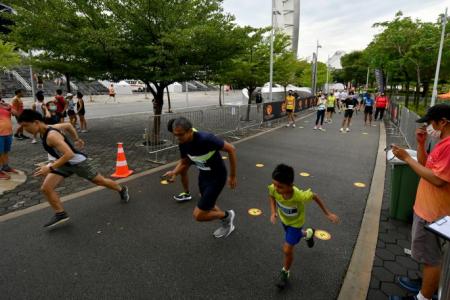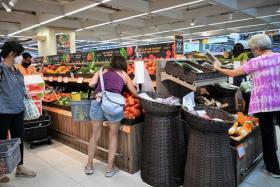$20 million to 'Bring Sport Back' in Singapore
After the pandemic hit in 2020, sports and wellness events company Orange Room was forced to cancel 31 of the 32 events it had lined up to take place in six countries in Asia that year.
Apart from the blow to revenue and cashflow, the company's capabilities were also shot. Its managing director, Mr Elvin Ting, said he had to reduce his team's headcount of 50 by about 70 per cent.
As the sports and events sector continues its reopening gingerly, Mr Ting has managed to rebuild staff numbers - now back up to 39 - but fluid restrictions on event guidelines, a necessary part of the battle against Covid-19, remain a constant challenge for organisers as they find their way back.
Limits on physical participation, for instance, mean event organisers struggle to break even, said Mr Ting.
"As a commercial company, we rely on sponsorship and ticketing revenue," he said.
"Covid has resulted in many sponsorships going quiet, and with the numbers (of participants capped)... it is almost impossible to organise mass events without losing money. And that is just not sustainable."
To help companies like Orange Room regain their footing and reinvigorate sports participation, Minister for Culture, Community and Youth Edwin Tong on Thursday (March 10) announced that $20 million will be committed to a plan to ramp up and cater to the increasing demand for sport.
Called 'Bring Sport Back', the plan aims to facilitate the reintroduction of mass participation events such as community runs, ramp up programmes and optimise sports facilities.
Said Mr Tong: "This (plan) is designed to reinvigorate Singapore sports, bring people back to play and enjoy sports together, and through sports, reconnect with one another."
In a bid to jumpstart mass participation events, national agency Sport Singapore (SportSG) will open a grant call to fund such events and festivals in a bid to facilitate the safe reintroduction of such events, added Mr Tong, who was speaking during his ministry's budget debate.
The Blended Events Grant-Bring Sport Back edition, which will be worth up to $50,000 per award, will be rolled out from later this month and is intended to support about 40 blended events or festivals this year.
Applications will be open for four weeks and events targeted for support will feature physical participation of between 1,000 and 3,000 people each - subject to prevailing safe management measures - and may be augmented with virtual participation.
The newest initiatives to support the sports events industry is part of the Sports Resilience Package (SRP) under which a series of capability development grants were offered by the Government since the start of the pandemic.
MCCY has already pumped some $75 million into the SRP since October 2020, which served to tide the sports sector through the pandemic while catalysing digitalisation and capability development for businesses. About 600 unique businesses and over 300 self-employed persons have been supported under the package.
Mr Ting, whose company benefited from two Blended Initiative grants which offered support of up to $270,000 for each award, said such assistance has been a big help as he rebuilds his team and company.
"The grants we have received have helped us preserve some talent and... maintain some core capability so that when the market does open up, we can adapt accordingly," he added.
Jeffrey Foo, managing director of Infinitus, also welcomed the newest initiatives.
His company, which organises the Sundown Marathon and The Straits Times Run among many others, had leveraged on two previous grants offered by SportSG, the Blended Initiative and Innovation Grant, the latter offered up to $180,000 per award.
"For any event to be successful, you need a good plan, and so the biggest concern for an event organiser now is that the policies and regulation are so fluid," said Mr Foo, who also had to slash his staff numbers by over 60 per cent.
"A change could mean a need for more manpower, a bigger venue... and an increase in cost, so it will affect profitability.
"For some smaller projects operated by companies with smaller headcounts, every dollar and cent matters. So grants like these really help small businesses like us kickstart things again."
Mr Ting is already planning regional events, and is on course to run a multi-sport series Tri-Factor event in Vietnam on April 9-10, followed by one in Singapore, then Philippines and then China.
"Keeping clear on goals, we are here to serve our community," he added. "But we cannot forget commercial viability and sustainability, in doing so.
"And if the Government can help mitigate this uncertainty through such grants, that will encourage us to take steps forward."
As part of the 'Bring Sport back' plan, SportSG will also provide more competition opportunities for Singaporeans throughout the year.
Last month, the ActiveSG Cup featured football and basketball competitions for youth aged 13 to 19. ActiveSG Leagues for other sports, namely athletics, canoeing, tennis, badminton, basketball and volleyball, will also be rolled out and provide playing opportunities for some 22,000 youth this year.
Sports facilities will also be optimised to encourage people to return to activities, and plans include repurposing spaces for a range of sports, and converting underused spaces into outdoor gyms, said Mr Tong.
Get The New Paper on your phone with the free TNP app. Download from the Apple App Store or Google Play Store now


